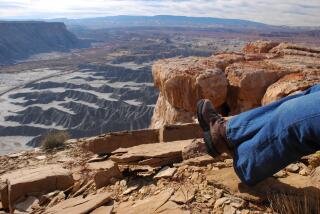Utah Governor Readies to Fight Nuclear Waste
- Share via
SALT LAKE CITY — Gov. Mike Leavitt created a special state office Thursday to try to block a proposal to bring 44,000 tons of high-level nuclear waste to Utah’s desert.
“I will deploy every tool I can,” Leavitt said. “We don’t produce this waste. We shouldn’t store it.”
Private Fuel Storage, a consortium of eight electric utilities, is seeking federal approval to store spent nuclear fuel rods in containers at the Skull Valley Goshute Reservation, 45 miles southwest of Salt Lake City.
Leavitt used an executive order and $50,000 in emergency funds to create the Office of High Level Nuclear Waste Opposition. Leavitt will ask the Legislature for $1 million per year to pay at least five attorneys to combat the storage plan in court.
Sue Martin, a spokeswoman for Private Fuel Storage, said that the consortium is following an established process for licensing the facility and that the state is a participant. She said the facility will be operated safely.
“What the governor seems to want to do is short-circuit the process and try to replace the established process with politics and legal action,” Martin said.
While details of the lease between the Skull Valley Goshutes and PFS have not been released, the tribe is expected to make a hefty profit.
Leavitt said he is considering new taxes, regulations and possibly even criminal measures to regulate the transportation and storage of nuclear waste under state law.
Opponents worry that the Skull Valley site could become permanent if a proposed storage site in Yucca Mountain, Nev., is blocked by that state’s political leaders.
Critics fear that storage casks could fail, water and air could be contaminated, property values could drop and cruise missiles or jets tested in the area could crash into the site.
However, the Nuclear Regulatory Commission declared the site safe and the casks sturdy. The military said the chances a jet would crash into the casks are extremely low.
The commission’s final decision on the site isn’t expected until sometime in 2002. Three other federal agencies must then approve the proposal.
More to Read
Sign up for Essential California
The most important California stories and recommendations in your inbox every morning.
You may occasionally receive promotional content from the Los Angeles Times.










